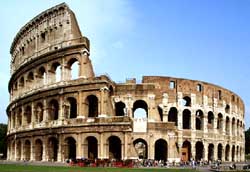DK History: Ancient Rome
Rome began, around 1000 BC, as a settlement of farmers and shepherds in central Italy. Over the course of the next thousand years, it developed into a powerful city-state, and became the capital of an empire that stretched from Britain in the north to Arabia in the southwest.

Opened by Emperor Titus in AD 80, the Colosseum was the largest amphitheater in Rome. For the blood-thirsty “games” staged here, gladiators and animals were imported from every corner of the empire.
Gradually, the Roman Republic conquered its neighbors, until, by 260 BC, it controlled all of Italy. Next, the Romans defeated the Carthaginians, which by 100 BC gave Rome control of the Mediterranean. At the heart of the government of this expanding Roman Republic were the politicians called SENATORS.
Jupiter, Minerva, Vesta, and Mars were among the chief gods and goddesses of Ancient Rome. On special occasions, animals were sacrificed to them in temples. Before going into battle, for example, a public sacrifice would be made to Mars, the god of war. Throughout the empire a wide range of non-Roman religions were tolerated, so long as they did not disrespect official Roman gods and the EMPERORS.
In the early days of Rome, every citizen had to be prepared to fight, but soldiers of the Roman imperial army were paid, highly trained professionals who signed on for 20-25 years of service. The ordinary foot soldier was equipped with a short sword, two javelins, and a heavy shield of leather and wood. When he was not at war, he was building forts and roads.
The Roman Republic was ruled by the Senate, the council of noblemen that controlled all the top jobs in the government and army. After 27 BC, when the Roman Republic was replaced by the Roman Empire, the Senate continued to play an important part in politics.
In 44 BC, five years after he had become the sole ruler of Rome, Julius Caesar was murdered in the Senate building. His assassins were a group of senators who thought he had become too powerful. They also resented the fact that Julius Caesar had rewarded hundreds of his supporters by making them senators. As a result, the Senate, which for most of its history had between 300 and 600 members, was packed with 900 senators.
After Julius Caesar’s death, Rome was divided by civil wars. By 27 BC, his adopted son Octavian was master of the Roman world. Under the title Augustus, which means “revered” in Latin, he became the first Roman emperor. His reign brought peace and prosperity to a war-weary world.
Rome was the largest city in the world. By AD 300, it had a million inhabitants, many of whom were hungry and unemployed. To stop them from rioting, they were given “bread and circuses.” The “bread” was the regular ration of grain issued to Roman citizens, and the “circuses” were the free entertainments and chariot races provided by politicians and emperors.
